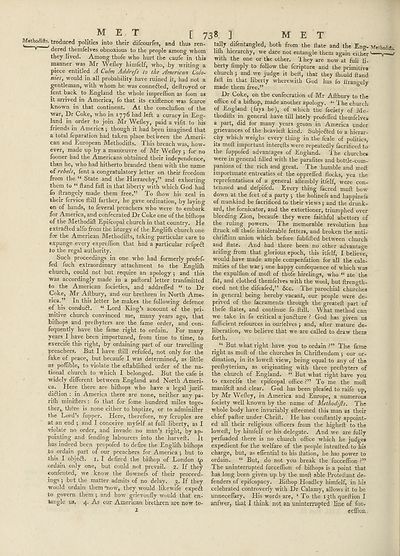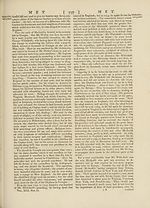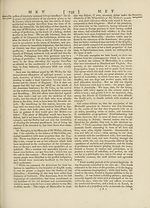Encyclopaedia Britannica, or, a Dictionary of arts, sciences, and miscellaneous literature : enlarged and improved. Illustrated with nearly six hundred engravings > Volume 13, MAT-MIC
(784) Page 738
Download files
Complete book:
Individual page:
Thumbnail gallery: Grid view | List view

MET
Methodifts, troduced politics into their difcourfes, and thus ren¬
dered themfelves obnoxious to the people among whom
they lived. Among thofe who hurt the caufe in this
manner was Mr Welley himfelf, who, by writing a
piece entitled A Calm Addrejs to the American Colo¬
nies, would in all probability have ruined it, had not a
gentleman, with whom he was connetted, deftroyed or
fent back to England the whole impreffion as foon as
it arrived in America, fo that its exiftence was fcarce
known in that continent. At the conclufion of the
war, Dr Coke, who in 1776 had left a curacy in Eng¬
land in order to join Mr Welley, paid a vifit to his
friends in America j though it had been imagined that
a total reparation had taken place between the Ameri¬
can and European Methodifts. This breach was, how¬
ever, made up by a manoeuvre of Mr Welley ; for no
fooner had the Americans obtained their independence,
than he, who had hitherto branded them with the name
of rebels, fent a congratulatory letter on their freedom
from the “ State and the Hierarchy,” and exhorting
them to “ Hand fait in that liberty with which God had
fo ftrangely made them free.” To Ihow his zeal in
their fervice Hill farther, he gave ordination, by laying
on of hands, to feveral preachers who were to embark
for America, and confecrated Dr Coke one of the bilhops
of the Methodift Epifcopal church in that country. Ele
extracted alfo from the liturgy of the Englidi church one
for the American Mcthodifts, taking particular care to
expunge every expreflion that had a particular refpeft
to the regal authority.
Such proceedings in one who had formerly profef-
fed fuch extraordinary attachment to the Englilh
church, could not but require an apology 5 and this
was accordingly made in a paftoral letter tranfmitted
to the American focieties, and addreffed “ to Dr
Coke, Mr Aftbury, and our brethren in North Ame¬
rica.” In this letter he makes the following defence
of his condudl. “ Lord King’s account of the pri¬
mitive church convinced me, many years ago, that
bilhops and prelbyters are the fame order, and con-
fequently have the fame right to ordain. For many
years I have been importuned, from time to time, to
exercife this right, by ordaining part of our travelling
preachers. But I have Hill refufed, not only for the
fake of peace, but becaufe I was determined, as little
as poffible, to violate the eftablilhed order of the na¬
tional church to which I belonged. But the cafe is
widely different between England and North Ameri¬
ca. Here there are bilhops who have a legal jurif-
didlion : in America there are none, neither any pa-
rilh minifters : fo that for fome hundred miles toge¬
ther, thfire is none either to baptize, or to adminifter
the Lord’s fupper. Here, therefore, my fcruples are
at an end ; and I conceive myfelf at full liberty, as I
violate no order, and invade no man’s right, by ap¬
pointing and fending labourers into the harveft. It
has indeed been propofed to defire the Englilh bilhops
to ordain part of our preachers for America ; but to
this I object 1. I delired the bilhop of London to
ordain only one, but could not prevail. 2. If they
confented, we know the flownefs of their proceed¬
ings ; but the matter admits of no delay. 3. If they
would ordain them 'now, they would likewife expedl
to govern them ; and howr grievoully would that en¬
tangle us, 4. As our American brethren are now to-
[ 738. ]
MET
tally difentangled, both from the Hate and the Eng- Methodifc.
lilh hierarchy, we dare not entangle them again either * •— J t
with the one or the other. '1 hey are now at full li¬
berty Amply to follow the feripture and the primitive
church j and we judge it belt, that they Ihould Hand
fait in that liberty wherewith God has io itrangely
made them free.”
Dr Coke, on the confecration of Mr Aflbury to the
office of a bilhop, made another apology. “ The church
of England (fays he), of which the fociety of Me-
thodiits in general have till lately profeffed themfelvei,
a part, did for many years groan in America under
grievances of the heavieit kind. Subjedted to a hierar¬
chy which weighs every tiling in the fcale of politics,,
its mofl important intermits were repeatedly facrihced to
the fuppofed advantages of England. The churches
were in general filled with the parafites and bottle-com¬
panions of the rich and great. The humble and moff
importunate entreaties of the oppreffed flocks, yea the
reprefentations of a general afiembly itfelf, were con¬
temned and defpifed. Every thing facred mufl bow
down at the feet of a party j the holinefs and happinefs
of mankind be facrificed to their views ; and the drunk¬
ard, the fornicator, and the extortioner, triumphed over
bleeding Zion, becaufe they were faithful abettors of
the ruling powers. The memorable revolution has
Hruck off thefe intolerable fetters, and broken the anti-
chriftian union which before fubfifted between church
and Hate. And had there been no other advantage
arifing from that glorious epoch, this itfelf, I believe,
would have made ample compenfation for all the cala¬
mities of the war ; one happy confequence of which was
the expulfion of moft of thofe hirelings, who “ ate the
fat, and clothed themfelves with the wool, but ftrength-
ened not the difeafed,” &c. The parochial churches
in general being hereby vacant, our people were de¬
prived of the facraments through the greateft part of
thefe Hates, and continue fo Hill. What method can
we take in fo critical a junflure ? God has given us
fufficient refources in ourlelves ; and, after mature de¬
liberation, we believe that we are called to draw them
forth.
“ But what right have you to ordain ?” The fame
right as moft of the churches in Chriftendom j our or¬
dination, in its loweft view, being equal to any of the
preffiyterian, as originating with three prefbyters of
the church of England. “ But what right have you
to exercife the epifcopal office ?” To me the moft
manifeft and clear. God has been pleafed to raife up,
by Mr Wefley, in America and Europe, a numerous
fociety well known by the name of Methodijls. The
whole body have invariably efteemed this man as their
chief paftor under Chrift. He has conftantly appoint¬
ed all their religious officers from the higheft to the
loweft, by himfelf or his delegate. And we are fully
perfuaded there is no church office which he judges
expedient for the welfare of the people intrufted to his
charge, but, as effential to his ftation, he has power to
ordain. “ But, do not you break the fucceffion ?”
The uninterrupted fucceffion of biffiops is a point that
has long been given up by the moft able Proteflant de¬
fenders of epifcopacy. Biffiop Hoadley himfelf, in his
celebrated controverfy with Dr Calamy, allows it to be
unneceffary. His words are, ‘ To the 13th queftion I
anfwer, that I think not an uninterrupted line of fuc¬
ceffion
Methodifts, troduced politics into their difcourfes, and thus ren¬
dered themfelves obnoxious to the people among whom
they lived. Among thofe who hurt the caufe in this
manner was Mr Welley himfelf, who, by writing a
piece entitled A Calm Addrejs to the American Colo¬
nies, would in all probability have ruined it, had not a
gentleman, with whom he was connetted, deftroyed or
fent back to England the whole impreffion as foon as
it arrived in America, fo that its exiftence was fcarce
known in that continent. At the conclufion of the
war, Dr Coke, who in 1776 had left a curacy in Eng¬
land in order to join Mr Welley, paid a vifit to his
friends in America j though it had been imagined that
a total reparation had taken place between the Ameri¬
can and European Methodifts. This breach was, how¬
ever, made up by a manoeuvre of Mr Welley ; for no
fooner had the Americans obtained their independence,
than he, who had hitherto branded them with the name
of rebels, fent a congratulatory letter on their freedom
from the “ State and the Hierarchy,” and exhorting
them to “ Hand fait in that liberty with which God had
fo ftrangely made them free.” To Ihow his zeal in
their fervice Hill farther, he gave ordination, by laying
on of hands, to feveral preachers who were to embark
for America, and confecrated Dr Coke one of the bilhops
of the Methodift Epifcopal church in that country. Ele
extracted alfo from the liturgy of the Englidi church one
for the American Mcthodifts, taking particular care to
expunge every expreflion that had a particular refpeft
to the regal authority.
Such proceedings in one who had formerly profef-
fed fuch extraordinary attachment to the Englilh
church, could not but require an apology 5 and this
was accordingly made in a paftoral letter tranfmitted
to the American focieties, and addreffed “ to Dr
Coke, Mr Aftbury, and our brethren in North Ame¬
rica.” In this letter he makes the following defence
of his condudl. “ Lord King’s account of the pri¬
mitive church convinced me, many years ago, that
bilhops and prelbyters are the fame order, and con-
fequently have the fame right to ordain. For many
years I have been importuned, from time to time, to
exercife this right, by ordaining part of our travelling
preachers. But I have Hill refufed, not only for the
fake of peace, but becaufe I was determined, as little
as poffible, to violate the eftablilhed order of the na¬
tional church to which I belonged. But the cafe is
widely different between England and North Ameri¬
ca. Here there are bilhops who have a legal jurif-
didlion : in America there are none, neither any pa-
rilh minifters : fo that for fome hundred miles toge¬
ther, thfire is none either to baptize, or to adminifter
the Lord’s fupper. Here, therefore, my fcruples are
at an end ; and I conceive myfelf at full liberty, as I
violate no order, and invade no man’s right, by ap¬
pointing and fending labourers into the harveft. It
has indeed been propofed to defire the Englilh bilhops
to ordain part of our preachers for America ; but to
this I object 1. I delired the bilhop of London to
ordain only one, but could not prevail. 2. If they
confented, we know the flownefs of their proceed¬
ings ; but the matter admits of no delay. 3. If they
would ordain them 'now, they would likewife expedl
to govern them ; and howr grievoully would that en¬
tangle us, 4. As our American brethren are now to-
[ 738. ]
MET
tally difentangled, both from the Hate and the Eng- Methodifc.
lilh hierarchy, we dare not entangle them again either * •— J t
with the one or the other. '1 hey are now at full li¬
berty Amply to follow the feripture and the primitive
church j and we judge it belt, that they Ihould Hand
fait in that liberty wherewith God has io itrangely
made them free.”
Dr Coke, on the confecration of Mr Aflbury to the
office of a bilhop, made another apology. “ The church
of England (fays he), of which the fociety of Me-
thodiits in general have till lately profeffed themfelvei,
a part, did for many years groan in America under
grievances of the heavieit kind. Subjedted to a hierar¬
chy which weighs every tiling in the fcale of politics,,
its mofl important intermits were repeatedly facrihced to
the fuppofed advantages of England. The churches
were in general filled with the parafites and bottle-com¬
panions of the rich and great. The humble and moff
importunate entreaties of the oppreffed flocks, yea the
reprefentations of a general afiembly itfelf, were con¬
temned and defpifed. Every thing facred mufl bow
down at the feet of a party j the holinefs and happinefs
of mankind be facrificed to their views ; and the drunk¬
ard, the fornicator, and the extortioner, triumphed over
bleeding Zion, becaufe they were faithful abettors of
the ruling powers. The memorable revolution has
Hruck off thefe intolerable fetters, and broken the anti-
chriftian union which before fubfifted between church
and Hate. And had there been no other advantage
arifing from that glorious epoch, this itfelf, I believe,
would have made ample compenfation for all the cala¬
mities of the war ; one happy confequence of which was
the expulfion of moft of thofe hirelings, who “ ate the
fat, and clothed themfelves with the wool, but ftrength-
ened not the difeafed,” &c. The parochial churches
in general being hereby vacant, our people were de¬
prived of the facraments through the greateft part of
thefe Hates, and continue fo Hill. What method can
we take in fo critical a junflure ? God has given us
fufficient refources in ourlelves ; and, after mature de¬
liberation, we believe that we are called to draw them
forth.
“ But what right have you to ordain ?” The fame
right as moft of the churches in Chriftendom j our or¬
dination, in its loweft view, being equal to any of the
preffiyterian, as originating with three prefbyters of
the church of England. “ But what right have you
to exercife the epifcopal office ?” To me the moft
manifeft and clear. God has been pleafed to raife up,
by Mr Wefley, in America and Europe, a numerous
fociety well known by the name of Methodijls. The
whole body have invariably efteemed this man as their
chief paftor under Chrift. He has conftantly appoint¬
ed all their religious officers from the higheft to the
loweft, by himfelf or his delegate. And we are fully
perfuaded there is no church office which he judges
expedient for the welfare of the people intrufted to his
charge, but, as effential to his ftation, he has power to
ordain. “ But, do not you break the fucceffion ?”
The uninterrupted fucceffion of biffiops is a point that
has long been given up by the moft able Proteflant de¬
fenders of epifcopacy. Biffiop Hoadley himfelf, in his
celebrated controverfy with Dr Calamy, allows it to be
unneceffary. His words are, ‘ To the 13th queftion I
anfwer, that I think not an uninterrupted line of fuc¬
ceffion
Set display mode to:
![]() Universal Viewer |
Universal Viewer | ![]() Mirador |
Large image | Transcription
Mirador |
Large image | Transcription
Images and transcriptions on this page, including medium image downloads, may be used under the Creative Commons Attribution 4.0 International Licence unless otherwise stated. ![]()
| Permanent URL | https://digital.nls.uk/192694242 |
|---|
| Attribution and copyright: |
|
|---|
| Description | Ten editions of 'Encyclopaedia Britannica', issued from 1768-1903, in 231 volumes. Originally issued in 100 weekly parts (3 volumes) between 1768 and 1771 by publishers: Colin Macfarquhar and Andrew Bell (Edinburgh); editor: William Smellie: engraver: Andrew Bell. Expanded editions in the 19th century featured more volumes and contributions from leading experts in their fields. Managed and published in Edinburgh up to the 9th edition (25 volumes, from 1875-1889); the 10th edition (1902-1903) re-issued the 9th edition, with 11 supplementary volumes. |
|---|---|
| Additional NLS resources: |
|

